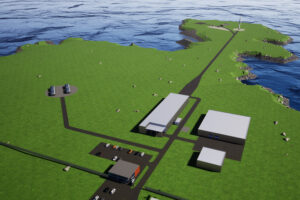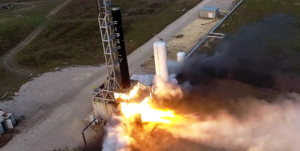Space Ops and Comms Jobs in the UK: Behind the Scenes
18th Aug 2022
“I work in Space Ops.”
There are few cooler things to be able to say at parties.
Space Operations and Communication jobs in the UK are still often seen as the stuff of science fiction. However, there are people on the ground every day working in these industries, within an incredibly exciting industry.
In the UK, the space industry has really taken off. A recent government report, explained that “over the past decade (2012 to 2021), 145 unique investors in 38 companies invested nearly £6 billion across 90 investment deals with UK space organisations.” We’re seeing the benefits now, as a private space industry joins RAF projects in providing an exciting employment opportunity. Analysts estimate that over 50,000 people now work in this industry in the United Kingdom.
“Communications” and “Operations” still sound vague to job hunters who are new to the industry, or who hope to train to work for a company exploring space. So, what does the job look like? How does one even start the process of getting a job in this field?
Space Ops and Communications – What The Job Entails
It is worth understanding, first and foremost, that the space industry is evolving. In the UK, there are many different organisations employing people to work in operations. However, the company objectives may vary from satellites to space travel and exploration.
Day to day activities will vary hugely from one position to the next, but could include:
- Developing and observing flight operational procedures and launches.
- Working on the concept and modes of different spacecraft, and software, as well as FDIR (Failure Detection, Isolation and Recovery).
- Assisting routine activities in launch and early orbit phases.
- Identifying and working on the operational constraints of spacecraft and launches.
- Telemetrics and trend analysis, working closely with data provided by satellites and other craft.
- Functional verification tasks including testing.
- Data engineering and analysis.
- Carrying out maintenance activities or troubleshooting within systems, including software and hardware.
- Performing inspections, and building and carrying out risk assessments.
These are certainly the sorts of roles where it is crucial to be flexible, as you can see from the varied nature of the tasks that you could undertake, and these are just some examples.
Could You Work in Space Ops and Communications? The Skills Required
Though there is no identikit worker profile in the space industry, there are certain skills and ways of thinking that tend to serve people well in these kinds of roles.
For instance, a great deal of those drawn to the industry have an analytical, statistical mindset, and/or a proficiency for engineering. If you are going to work for one of the UK’s key players in space, then you are going to have honed these skills through higher education, too.
This guide from the University of Birmingham speaks at length about the skills that are in demand in the sector.
“While some space sector firms require one or more specific space specialisms – such as satellite imagery processing and interpretation, orbital mechanics, launch operations, space system engineering, etc., there is also strong demand for generic technical skills – such as data science, AI techniques, software engineering, etc.”
- Anne Green, Professor of Regional Economic Development at City-REDI / WM REDI, University of Birmingham.
As well as the analytical skills and STEM proficiencies required, flexibility can prove to be a huge skill and asset in this role. The ability to think quickly, adapt, and work in a number of scenarios (often over long hours) is bound to stand you in good stead.
Education
The educational establishments of the United Kingdom have risen to the challenge presented by the growth in the space industry. There are many great courses nowadays that specialise in aerospace and aeronautical engineering.
Universities offering specific degrees in space-related subjects include:
- Imperial College London
- Loughborough University
- University of Bristol
- University of Glasgow
- University of Leeds
- University of Southampton
- University of Sheffield
- University of Surrey
A degree in this field will serve your application very well, but qualifications in mechanical engineering and other STEM areas may also help you out when applying for these sorts of roles.
Space Ops and the RAF
A different route into a career in space could also be found within the RAF. As you would expect, this has more of a focus on defence. However, the role of Air Operations (Systems) Officer within the RAF includes surveillance, monitoring space debris, and communications.
One of the most appealing aspects of this role is the fact that you can apply without reaching the absolute pinnacle of academia. The RAF provides a lot of the training required. You simply must attest between the ages of 17.5 and 47, and have either two A Levels with Grade C or above, or a UK degree at grade 2:2 or above. This opens up the opportunities for more candidates.
Within this training, you then undertake a “challenging 24-week course designed to develop your strength, fitness, leadership and academic skills”.
You’ll complete a Foundation Module and then be assigned to one of the two core specialisations for the aerospace roles, Aerospace Surveillance or Flight Operations. Training takes place at RAF Shawbury in Shropshire.
There is a huge amount of training, so the fact that the entrance requirements are less stringent doesn’t mean an easy ride. Also, taking this RAF route may not provide the same career progression opportunities, certainly externally, if you don’t have a degree. If you don’t have an interest in defence, a different route into the industry might be more appropriate.
An Evolving Industry
The job roles in this industry vary greatly, and they are evolving. The UK companies dealing in space and satellites all have differing objectives, funding, and stakeholders. Operations and Communications jobs are crucial, and keep these companies moving in the right direction. The fact there is no templated job description is one of the things making the industry careers so exciting and rewarding, not just a cool thing to say at parties.






Thank you for your comment! It will be visible on the site after moderation.